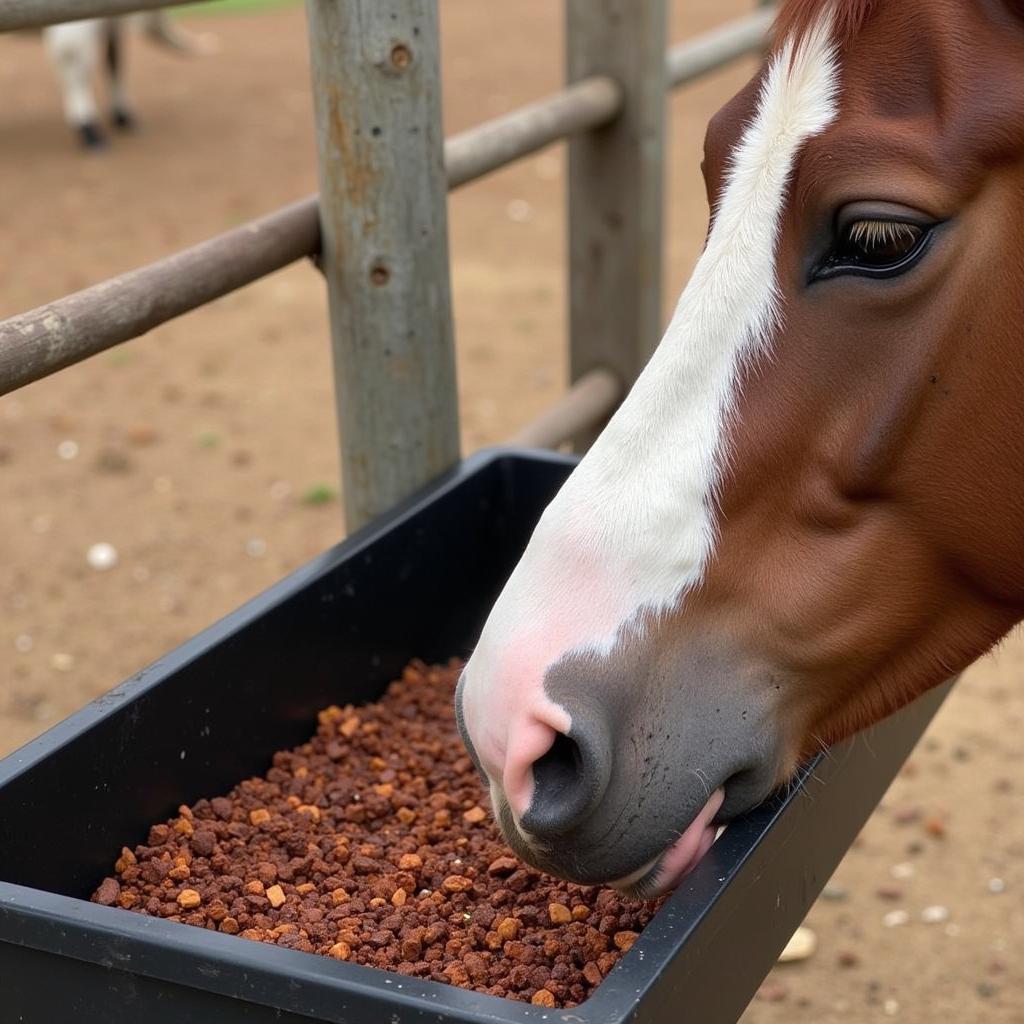Salt blocks for horses are more than just a treat; they’re a vital part of equine nutrition. Providing adequate salt intake helps maintain electrolyte balance, supports proper hydration, and ensures overall well-being. This article will delve into the importance of Horse Salt Blocks, different types available, and how to choose the right one for your equine companion.
Understanding the role of salt in a horse’s diet is crucial for responsible horse ownership. Sodium and chloride, the primary components of salt, are essential minerals that play a critical role in various bodily functions. They help regulate fluid balance, nerve and muscle function, and digestion. horse salt blocks are a convenient and effective way to supplement a horse’s natural salt intake, especially crucial for horses in training or those experiencing hot weather.
Why Do Horses Need Salt?
Salt is vital for maintaining a horse’s overall health. Insufficient salt intake can lead to dehydration, muscle weakness, and even colic. do horses need a salt block provides a readily available source of this essential mineral, allowing horses to self-regulate their intake based on their individual needs.
- Hydration: Salt helps horses retain water, which is crucial for preventing dehydration, especially during strenuous activity or in hot climates.
- Muscle Function: Proper sodium and chloride levels are essential for healthy muscle contractions and nerve impulses.
- Digestion: Salt plays a role in the production of hydrochloric acid in the stomach, aiding in the digestion of food.
- Electrolyte Balance: Salt is a key electrolyte, helping to regulate the body’s fluid balance and maintain optimal pH levels.
Choosing the Right Horse Salt Block
Not all salt blocks are created equal. There are various types available, each with its own benefits and drawbacks. Consider these factors when selecting a salt block for your horse:
- Type of Salt: white salt block for horses are the most common and affordable option, providing pure sodium chloride. Himalayan salt blocks offer additional trace minerals. Mineralized salt blocks are fortified with other essential minerals, offering a more comprehensive supplement.
- Form: Traditional block form is widely available and easy to use with a salt block holder for horses. Loose salt can be added to feed or offered in a separate container.
- Horse’s Needs: Consider your horse’s workload, climate, and overall health when choosing a salt block. Horses in heavy work or hot weather may require more salt than those in light work or cooler climates.
“The key is to observe your horse’s behavior,” advises Dr. Emily Carter, Equine Nutritionist. “If your horse is excessively licking the salt block or showing signs of salt deficiency, adjust the type or availability accordingly.”
Alternatives to Salt Blocks
While salt blocks are a convenient option, some horses may not consume enough from a block alone. loose minerals for horses offers a convenient alternative to traditional block form and can be easily mixed into feed. This can be particularly beneficial for horses with dental issues or those who are simply not interested in licking a block.
“For picky eaters, adding loose salt directly to the feed can ensure they receive the necessary sodium and chloride,” notes Dr. Carter. “This is especially helpful for horses who are not consuming enough from a traditional salt block.”
 Horse Eating Minerals from a Feeder
Horse Eating Minerals from a Feeder
In conclusion, horse salt blocks are an essential component of equine nutrition. By understanding your horse’s individual needs and choosing the right type of salt supplement, you can contribute to their overall health and well-being. Remember, providing access to a salt source is crucial for maintaining proper hydration, muscle function, and electrolyte balance in your equine companion.
FAQ
- How much salt does a horse need per day?
- Can a horse have too much salt?
- What are the signs of salt deficiency in horses?
- Are Himalayan salt blocks better than white salt blocks for horses?
- How do I know if my horse is getting enough salt?
- Can I use table salt for my horse?
- What should I do if my horse isn’t licking the salt block?
If you need assistance, please contact us at Phone: 0772127271, Email: [email protected] or visit us at QGM2+WX2, Vị Trung, Vị Thuỷ, Hậu Giang, Vietnam. We have a 24/7 customer service team.